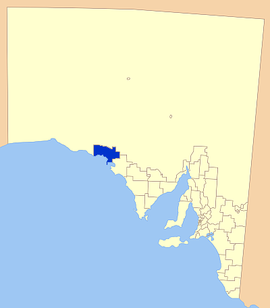District Council of Ceduna
|
District Council of Ceduna South Australia |
|||||||||||||
|---|---|---|---|---|---|---|---|---|---|---|---|---|---|

Location of the District Council of Ceduna
|
|||||||||||||
| Population | 3,716 (2015 est) | ||||||||||||
| • Density | 0.68471/km2 (1.77340/sq mi) | ||||||||||||
| Established | 1896 | ||||||||||||
| Area | 5,427.1 km2 (2,095.4 sq mi) | ||||||||||||
| Mayor | Allan Suter | ||||||||||||
| Council seat | Ceduna | ||||||||||||
| Region | Eyre and Western | ||||||||||||
| State electorate(s) | Flinders | ||||||||||||
| Federal Division(s) | Grey | ||||||||||||
 |
|||||||||||||
| Website | District Council of Ceduna | ||||||||||||
|
|||||||||||||
The District Council of Ceduna is a local government area located on the far west coast of the Eyre Peninsula in South Australia. The district has a diverse business and industry with an estimated 240,000 tourists passing through every year. The township of Ceduna is the focal point of the district.
The land in the district has long been used for agricultural purposes, in fact, between the 1850s and 1880s, much of the land was one large sheep station. Now most blocks are around 9,000 acres (36 km2) and mostly farming cereal crops such as wheat, oats and barley; as well as , particularly sheep.
Port Thevenard has been an exporter of gypsum and salt, with up to 1.2 million tonnes of gypsum being exported per year.
Smoky Bay and Denial Bay have been growing oysters using aquaculture for over ten years now, with Denial and Smoky Bay now the second and third largest producing areas in the state respectively.
Tourism is also a large part of the districts economy, with Smoky Bay and Ceduna attracting the largest crowds. The area's attractions are largely to do with the marine environment, with fishing and whale watching popular.
The council was first established in 1925 as the District Council of Murat Bay. It was renamed the District Council of Ceduna in 1994.
...
Wikipedia
